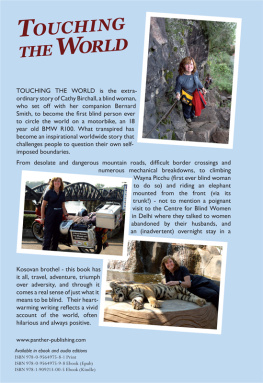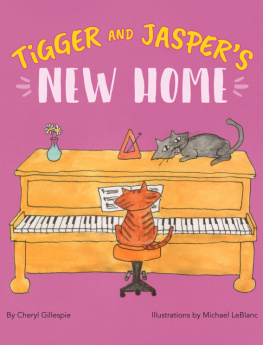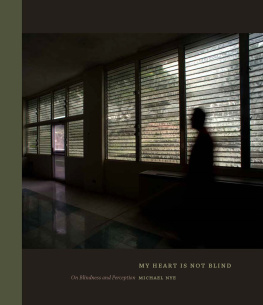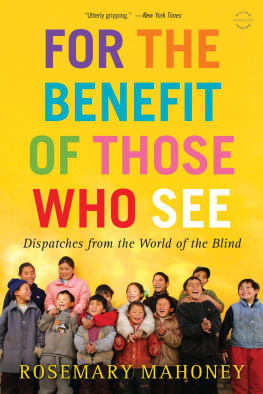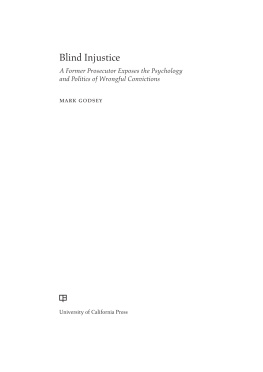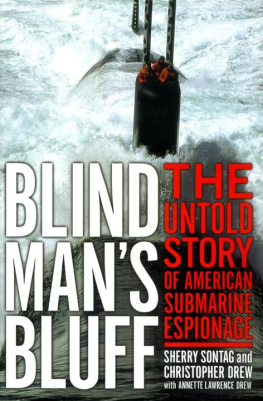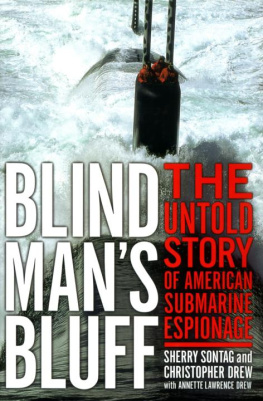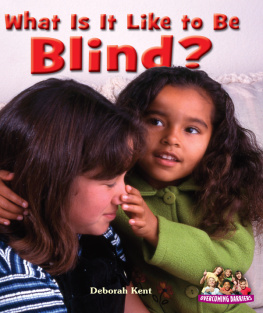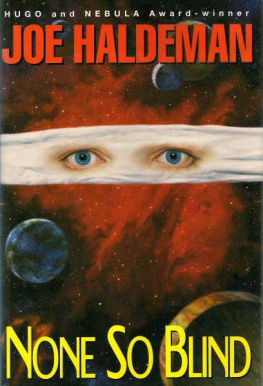Preface
Being blind means you see the world in a different way.
Wandering through the everyday things of life you may well cross paths with a person using a long white cane or a lovely bundle of fur called a guide dog. If this happens you will probably step to one side to let them pass before thinking, I wonder how they?
This story, in many ways, reflects on such things as throughout our long miles together on a motorcycle people would stand shaking their heads on realising Cathy was blind. You see, she belongs to the 5% of visually impaired people who have no useful vision. In Cathys case I do mean nada, zip, nothing. Across time life robbed her of what once was, leaving only recollections of a visual existence in her memory. Now she lives in a continuous rolling grey cloud that drifts across her vision swamping all before it.
With this answer, this description, this scary thought for most of us, you may well be formulating your next question:
But if she cant see how can she come to know and write about the world?
A fair question to pose but we might also ask why blind people watch television, go to the cinema, or sit in theatres? Moreover, when they do, does this lack of sight mean they gain little or no understanding of what transpires before them? Our answer to this is contained throughout the pages of our meandering journey through this chaotic, scary, wonderful, exhilarating, delightful world.
Its important to understand that each one of us constructs a different world, despite having the same things in front of our very eyes. How is this possible? I will leave that philosophical curiosity for you to ponder, but in truth, Cathy experienced so much more of the world than just a film or a stage production as she physically and emotionally lived and breathed the story in its entirety.
With that in mind we would like to say that we never actually set out to write a book about her blindness as such. Blindness is only one aspect of Cathys life, not the totality of it; it is not who she is. The title of this book was chosen long ago because we wanted to encompass her blindness as one of the THREE very different aspects to the story. To do anything else, for us, would have been to miss an important panoply of experiences and memories written deeply into us, in both similar and different ways. If we had done anything else it would have weakened the very true tale that these pages will tell.
For now, I would like to add my own thanks concerning the communication system provided by Autocom. Without their support, I would have been seriously compromised in my ability to translate vision into words, conditions into emotions, and the world into shades of everything else in oh so many different ways. Try to imagine a year of describing the world so that you can share it in a meaningful way with another person as it sits before your eyes in ways youve never before thought of recounting. Now you are me.
Because of this experience I became a better person in fundamentally different ways. No greater thing could I have asked for. Now, before we go on:
You are standing alone on an empty beach. The sky above you is the brightest blue
Bernard Smith
Acknowledgements
This book would not have happened without Bernards tenacity and single mindedness. I say this, as never did he waver from the story we set out to tell. Indeed, I believe it is a rare person who would have attempted such a feat as guiding a blind person around the world. Throughout it all he endured my foibles in long suffering patience and, generally, with good humour (apart from in India, as you will find out). No words can ever truly express my gratitude to him for opening up this marvellous planet so completely to me.
It is also important to acknowledge the role of both Autocom Communications (www.autocom.co.uk) and Dolphin Computer Access (www.yourdolphin.com). Both companies provided vital equipment for me in terms of my blindness. Without their freely given assistance, it would be true to say that everything would have been so much harder as a blind person. I can never thank them enough for their assistance.
We would also like to thank sincerely Rollo Turner from Panther Publishing who took the time to read and understand the story we wanted to tell. You see in this world of celebrity culture it is sometimes hard to hear ordinary people amongst all the clamour. However, when Rollo read the manuscript he got it. Importantly, he believed in it. For that simple understanding which so eluded many others, we are truly grateful. It made everything else so much easier.
My final thoughts go out to all the people who followed our journey across those long miles and sent their support through the wonderful virtual land of cyber space. Sometimes it was the thoughts and prayers of friends we have never met that got us through some very hard and very scary days.
Introduction
As a small child I had no idea my eyesight was anything other than normal. My world consisted of shifting shadows and indistinct images, which I exuberantly interpreted in the way a child does. It never occurred to me other people could see more than virtually nothing when darkness fell. Objects such as lampposts or bins on the pavement were all merrily clattered into as passing people probably thought me distracted or clumsy.
Throughout my early years I climbed indistinct trees, played with my indistinct friends, and made my way through time in the way of children. Growing older with my sight, or lack of it affecting me more, I was often left sitting on schoolyard walls. Meanwhile my friends played netball, hockey, or simply ran around as youngsters do in playgrounds everywhere. Thus I sat and listened, sidelined by what I could not see in a chaotic, frantic, beautiful playground. Excluded, marginalised, and often alone, I was betrayed before I was ever born, by little cells in my eyes programmed so that they would never work properly.
In class teachers would tell me off for copying from friends books, making me feel a failure: small and stupid from an early age. Their disappointment fed the belittlement of me although looking back I do not blame them now. The teachers were, by-and-large, good people who simply did not recognise or understand as I peered so hard at a board I would never see. The same was true of books whose pages shifted the more I concentrated on them, revealing little more than fuzzy shapes. Thus, I struggled in the twilight of even the brightest classroom as I continued to sit on walls while everybody else ran around with excited voices.

